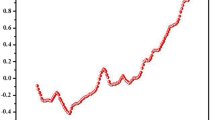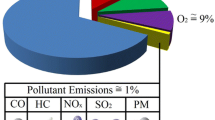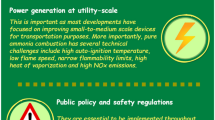Abstract
The reduction of various nitrogen oxide (NOx) emissions from diesel engines is an important environmental issue due to their negative impact on air quality and public health. Selective catalytic reduction (SCR) has emerged as an effective technology to mitigate NOx emissions, but predicting the performance of SCR systems remains a challenge due to the complex chemistry involved. In this study, we propose using DNN models to predict NOx emission reductions in SCR systems. Four types of datasets were created; each consisted of five variables as inputs. We evaluated the models using experimental data collected from a diesel engine equipped with an SCR system. Our results indicated that the deep neural network (DNN) model produces precise estimates for exhaust gas temperature, NOx concentration, and De-NOx efficiency. Moreover, inclusion of additional input features, such as engine speed and temperature, improved the prediction accuracy of the DNN model. The mean absolute error (MAE) values for these parameters were 3.1 °C, 3.04 ppm, and 3.65%, respectively. Furthermore, the R-squared coefficient of determination values for the estimates were 0.912, 0.983, and 0.905, respectively. Overall, this study demonstrates the potential of using DNNs to accurately predict NOx emissions from diesel engines and provides insights into the impact of input features on the performance of the model.















Similar content being viewed by others
Data availability
Data will be made available on request.
References
Acharya T (2020) Understanding feature extraction using correlation matrix and scatter plots | by Tarun Acharya | Towards Data Science [WWW Document] (n.d.) https://towardsdatascience.com/understanding-feature-extraction-using-correlation-matrix-and-scatter-plots-6c19e968a60c. Accessed 14 Nov 2022
Cloud of boiled probability (2019) ANN, DNN, CNN, RNN concepts and differences [WWW Document]. https://ebbnflow.tistory.com/119
Basic Information about NO2 | US EPA [WWW Document] (2023). https://www.epa.gov/no2-pollution/basic-information-about-no2. Accessed 16 Jan 2023
Doan BQ, Nguyen XP, Pham VV, Dong TMH, Pham MT, Le TS (2022) Performance and emission characteristics of diesel engine using ether additives: a review. Int J Renew Energy Dev 11:255–274. https://doi.org/10.14710/IJRED.2022.42522
Greenberg B (2009) Introduction to the Practice of Statistics Sixth Edition. W.H. Free. Co. New York
Kim H-S, Kasipandi S, Kim J, Kang S-H, Kim J-H, Ryu J-H, Bae J-W (2020) Current catalyst technology of selective catalytic reduction (SCR) for NOx removal in South Korea. Catalysts 10(1):52. https://doi.org/10.3390/catal10010052
Koebel M, Olav Strutz E (2003) Thermal and hydrolytic decomposition of urea for automotive selective catalytic reduction systems: thermochemical and practical aspects. Ind Eng Chem Res 42 (10):2093–2100. https://doi.org/10.1021/ie020950o
Li GQ, Qi XB, Chan KCC, Chen B (2017) Deep bidirectional learning machine for predicting NOx emissions and boiler efficiency from a coal-fired boiler. Energy Fuels 31:11471–11480. https://doi.org/10.1021/ACS.ENERGYFUELS.7B01415/ASSET/IMAGES/LARGE/EF-2017-01415M_0005.JPEG
Pillai R, Triantopoulos V, Berahas AS, Brusstar M, Sun R, Nevius T, Boehman AL (2022) Modeling and predicting heavy-duty vehicle engine-out and tailpipe nitrogen oxide (NOx) emissions using deep learning. Front Mech Eng 8:2297–3079. https://doi.org/10.3389/FMECH.2022.840310
Quintanilha IM et al. (2021) A fault detector/classifier for closed-ring power generators using machine learning. Reliab Eng Syst Saf 212:107614. https://doi.org/10.1016/j.ress.2021.107614
Schmidt-Hieber J (2020) Nonparametric regression using deep neural networks with ReLU activation function. https://doi.org/10.1214/19-AOS1875 48:1875–1897. https://doi.org/10.1214/19-AOS1875
Seo J, Yun B, Park J, Park J, Shin M, Park S (2021) Prediction of instantaneous real-world emissions from diesel light-duty vehicles based on an integrated artificial neural network and vehicle dynamics model. Sci Total Environ 786:147359. https://doi.org/10.1016/J.SCITOTENV.2021.147359
Shin S, Lee Y, Kim M, Park J, Lee S, Min K (2020) Deep neural network model with Bayesian hyperparameter optimization for prediction of NOx at transient conditions in a diesel engine. Eng Appl Artif Intell 94:103761. https://doi.org/10.1016/J.ENGAPPAI.2020.103761
Stack Exchange (2023) Model selection - How to choose the number of hidden layers and nodes in a feedforward neural network? - Cross Validated [WWW Document] (n.d.) https://stats.stackexchange.com/questions/181/how-to-choose-the-number-of-hidden-layers-and-nodes-in-a-feedforward-neural-netw. Accessed 18 Jan 2023
Wang J, Feng Y, Ye S, Zhang Y, Ma Z, Dong F (2022) Nox emission prediction of coal-fired power units under uncertain classification of operating conditions. SSRN Electron J. https://doi.org/10.2139/SSRN.4183422
Wardana MKA, Lim O (2022) Investigation of ammonia homogenization and NOx reduction quantity by remodeling urea injector shapes in heavy-duty diesel engines. Appl Energy 323. https://doi.org/10.1016/j.apenergy.2022.119586
Wardana MKA, Oh K, Lim O (2020) Investigation of urea uniformity with different types of urea injectors in an SCR system. Catalysts 10:1269. https://doi.org/10.3390/CATAL10111269
Yu Y, Wang Y, Li J, Fu M, Shah AN, He C (2021) A novel deep learning approach to predict the instantaneous NOxemissions from diesel engine. IEEE Access 9:11002–11013. https://doi.org/10.1109/ACCESS.2021.3050165
Zhang W, Li J (2022) Research on fault diagnosis and signal reconstruction technology of diesel engine NOx sensor based on deep learning algorithm. Proceedings of the Institution of Mechanical Engineers, Part D: Journal of Automobile Engineering. 2022;0(0). https://doi.org/10.1177/09544070221144658
Funding
This research is financially supported by the individual basic research project by the National Research Foundation of Korea (NRF‐2021R1F1A1048238, Reliability Improvement of Ammonia‐ Diesel Dual‐Fuel Combustion Model regarding Optimized Combustion Strategy for Improved Combustion Efficiency and Emission Characteristics). This results was supported by "Regional Innovation Strategy (RIS)" through the National Research Foundation of Korea (NRF) funded by the Ministry of Education (MOE)(2021RIS-003).
Author information
Authors and Affiliations
Contributions
BFS: Methodology, writing—reviewing formal analysis and resources and editing
QNY: Conceptualization, writing—reviewing formal analysis and resources and editing
OGC: Methodology
OL: Supervision, project administration
Corresponding author
Ethics declarations
Consent to participate
All authors of this manuscript consent to participate.
Consent for publication
All authors of this manuscript have consent to its publication.
Competing interests
The authors declare no competing interests.
Additional information
Responsible Editor: Philippe Garrigues
Publisher's Note
Springer Nature remains neutral with regard to jurisdictional claims in published maps and institutional affiliations.
Rights and permissions
Springer Nature or its licensor (e.g. a society or other partner) holds exclusive rights to this article under a publishing agreement with the author(s) or other rightsholder(s); author self-archiving of the accepted manuscript version of this article is solely governed by the terms of such publishing agreement and applicable law.
About this article
Cite this article
Samosir, B.F., Quach, N.Y., Chul, O.K. et al. NOx emissions prediction in diesel engines: a deep neural network approach. Environ Sci Pollut Res 31, 713–722 (2024). https://doi.org/10.1007/s11356-023-30937-3
Received:
Accepted:
Published:
Issue Date:
DOI: https://doi.org/10.1007/s11356-023-30937-3




